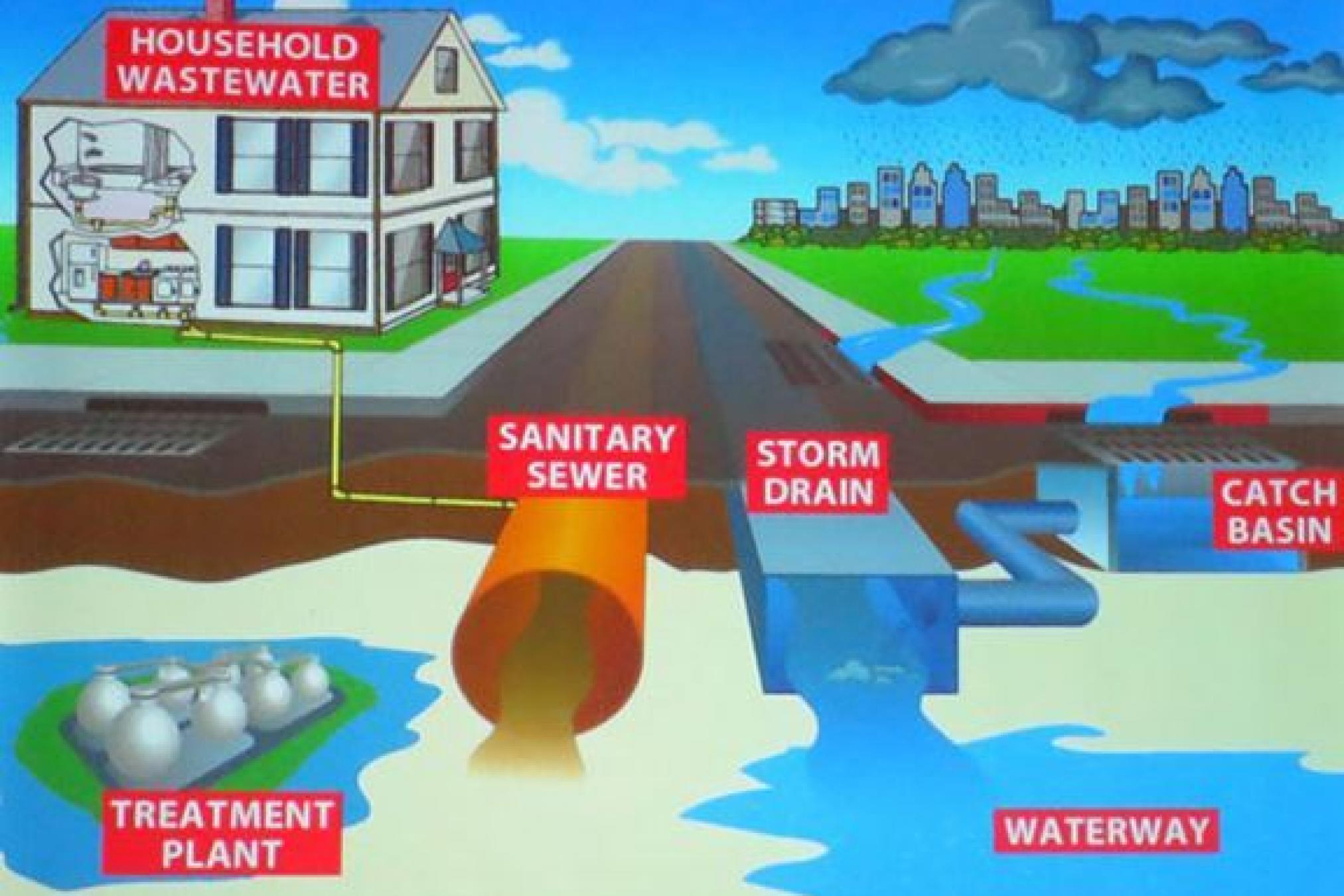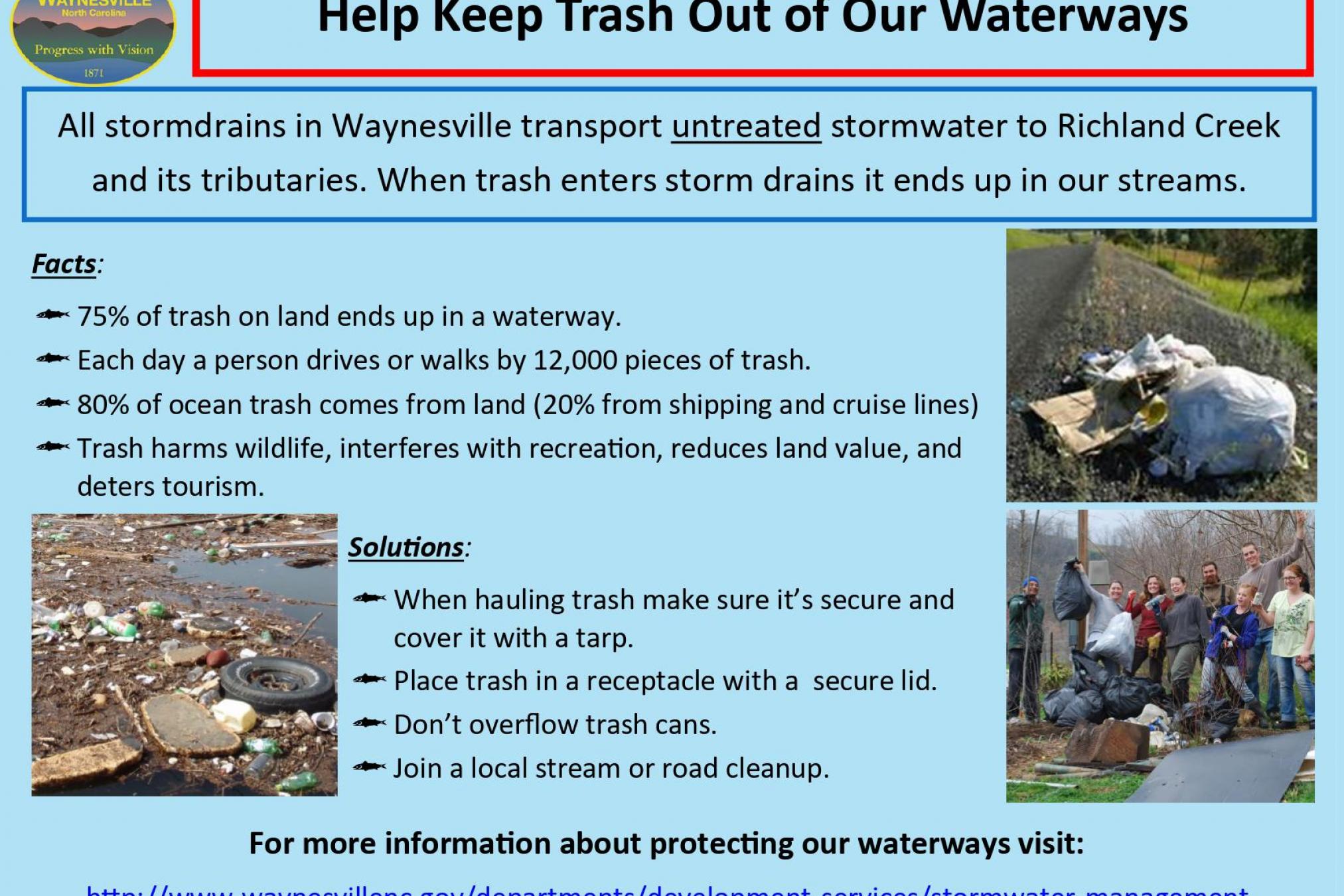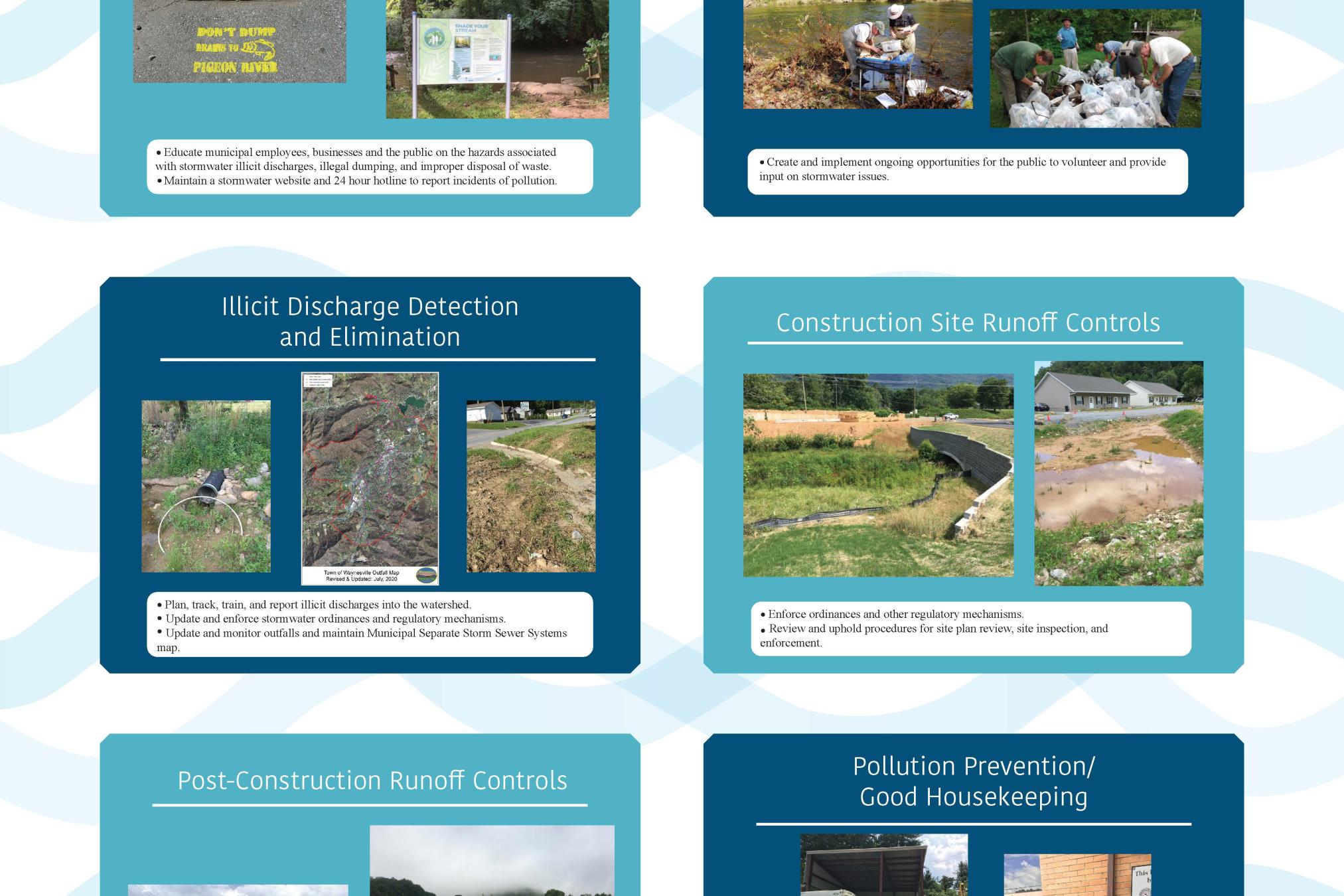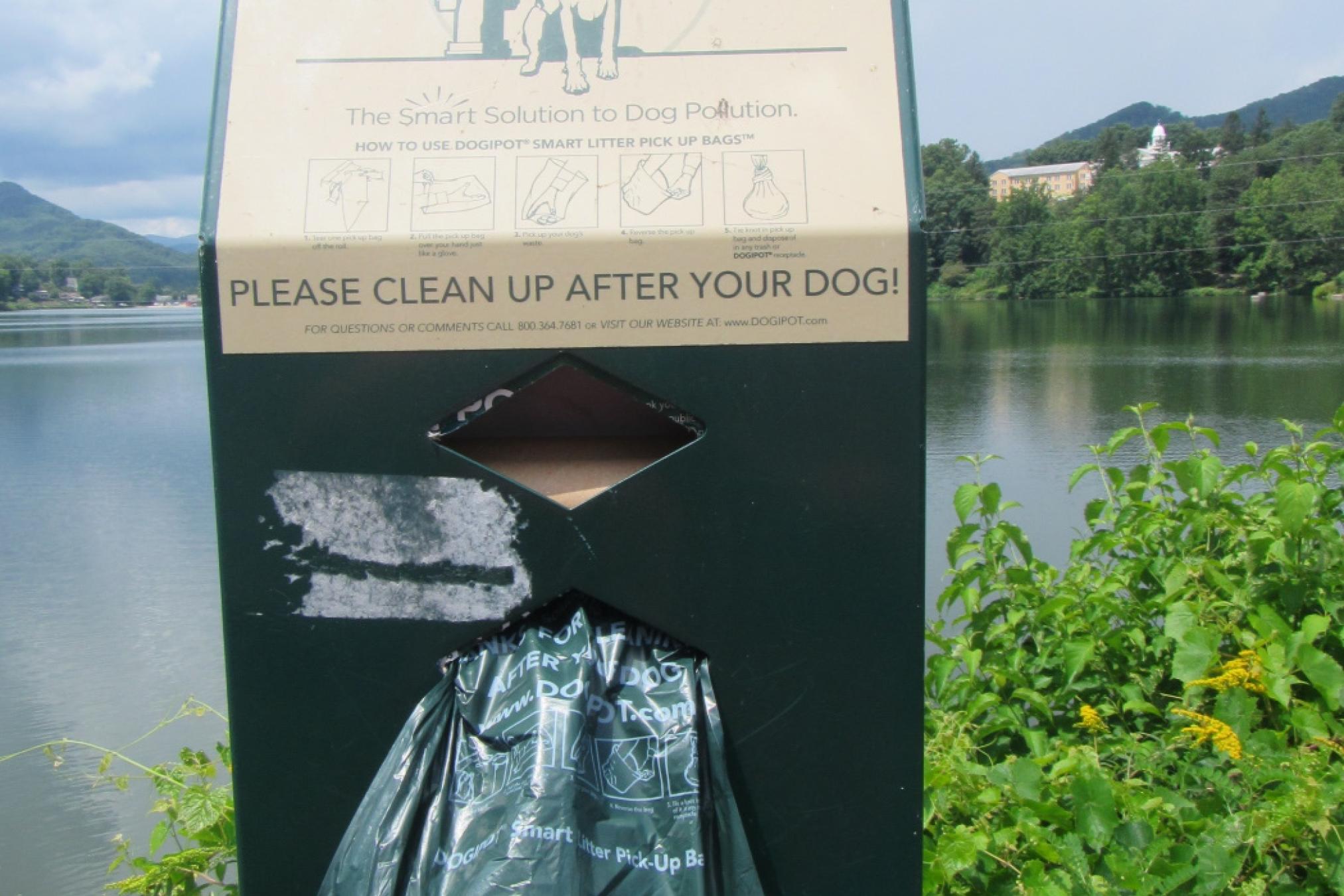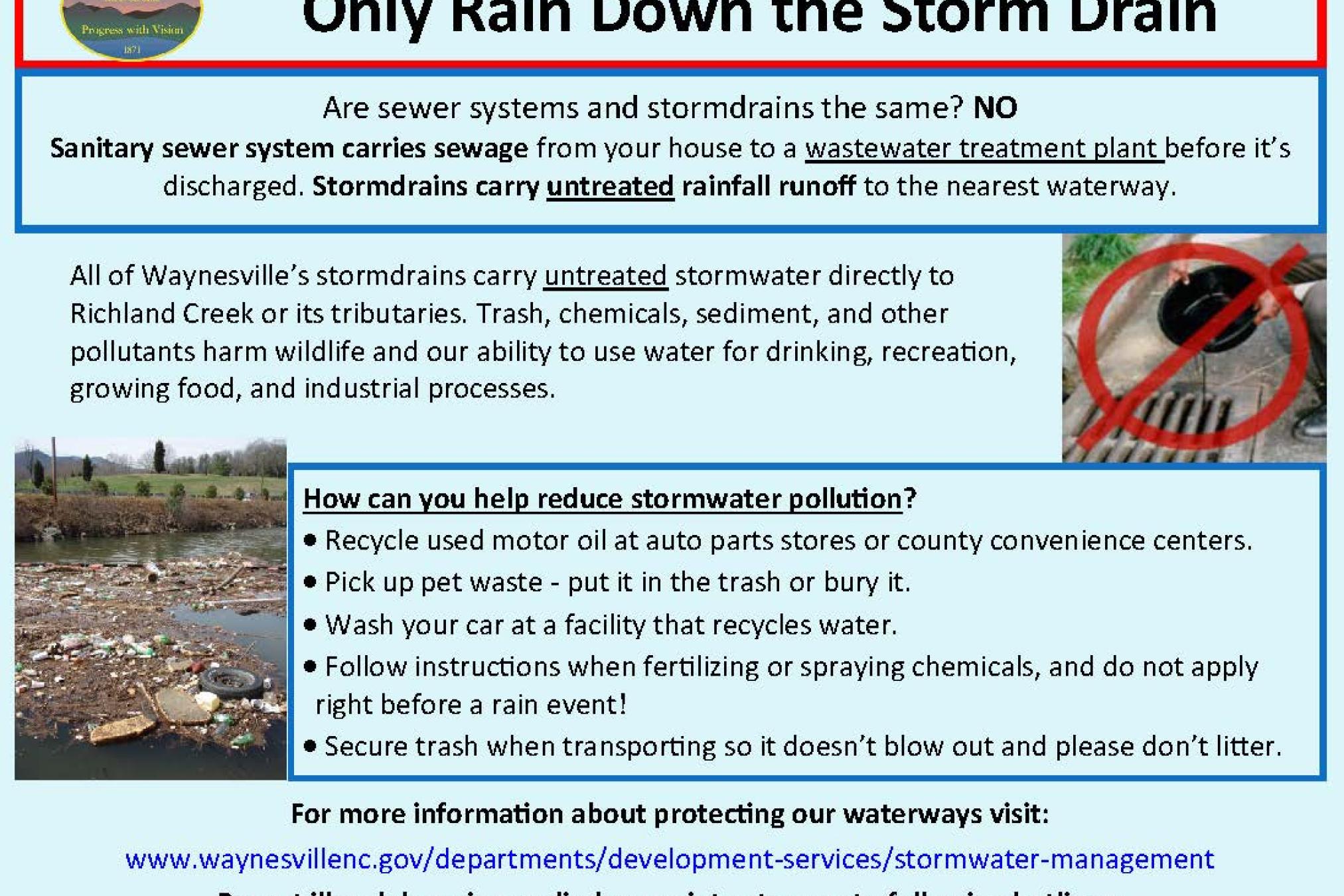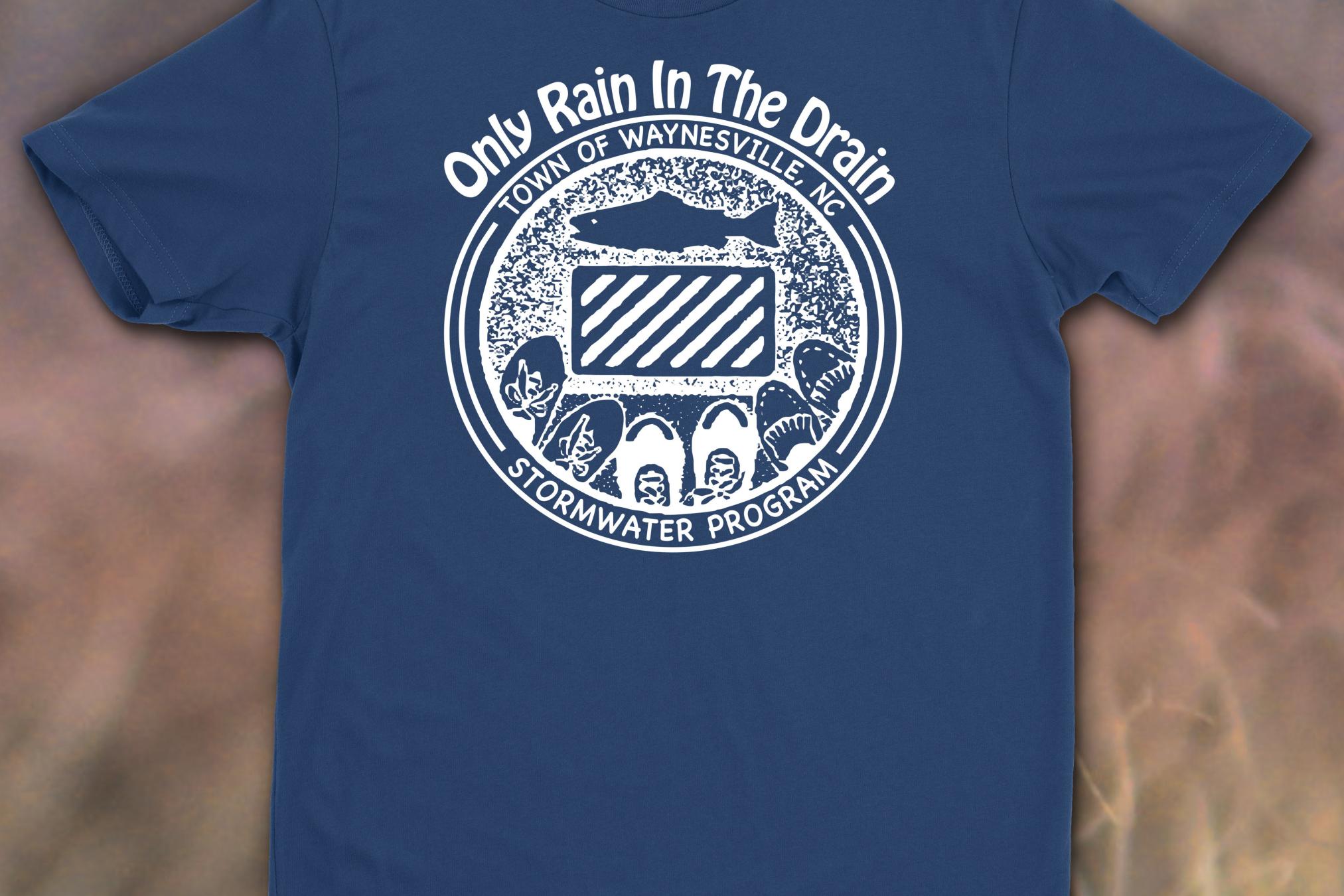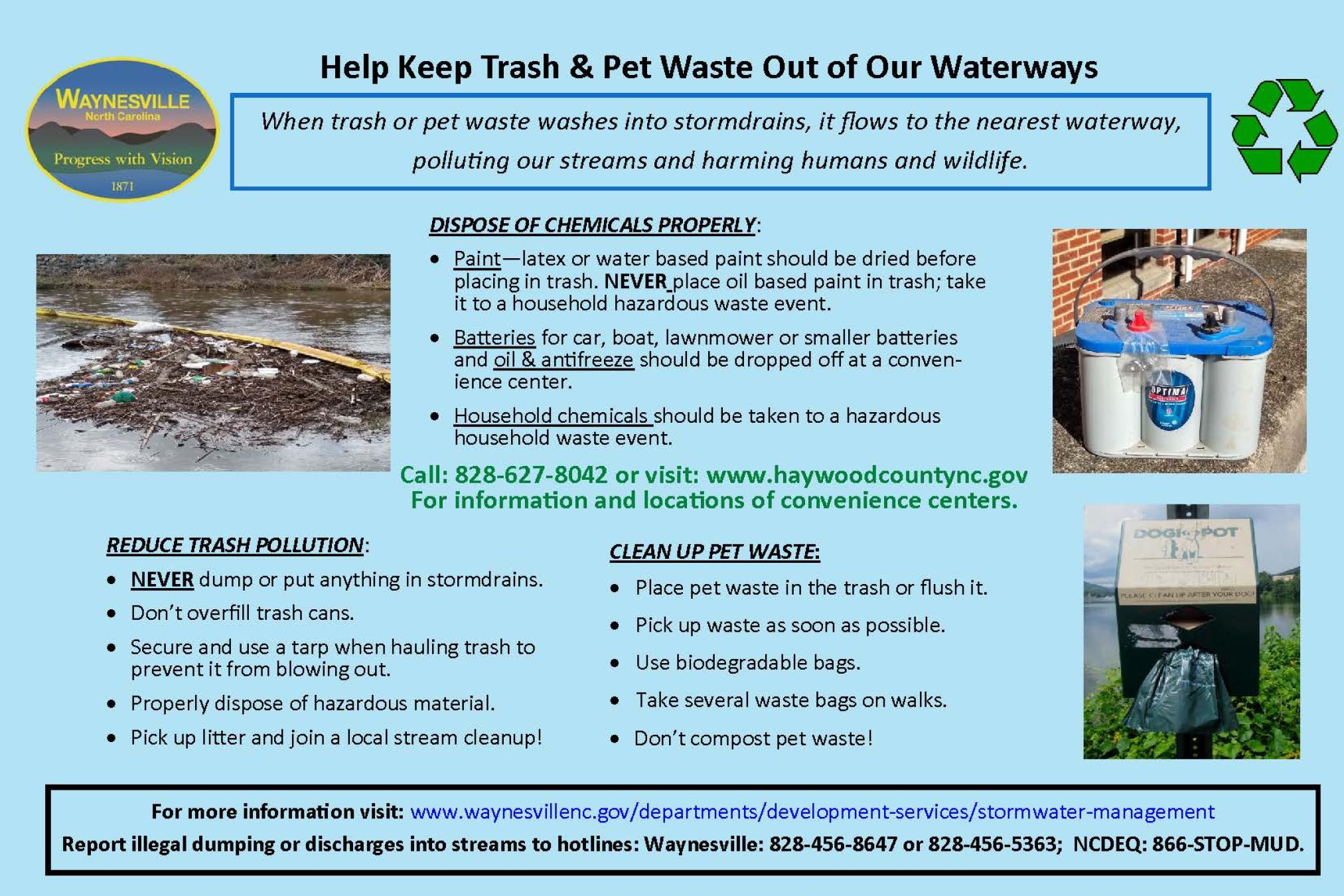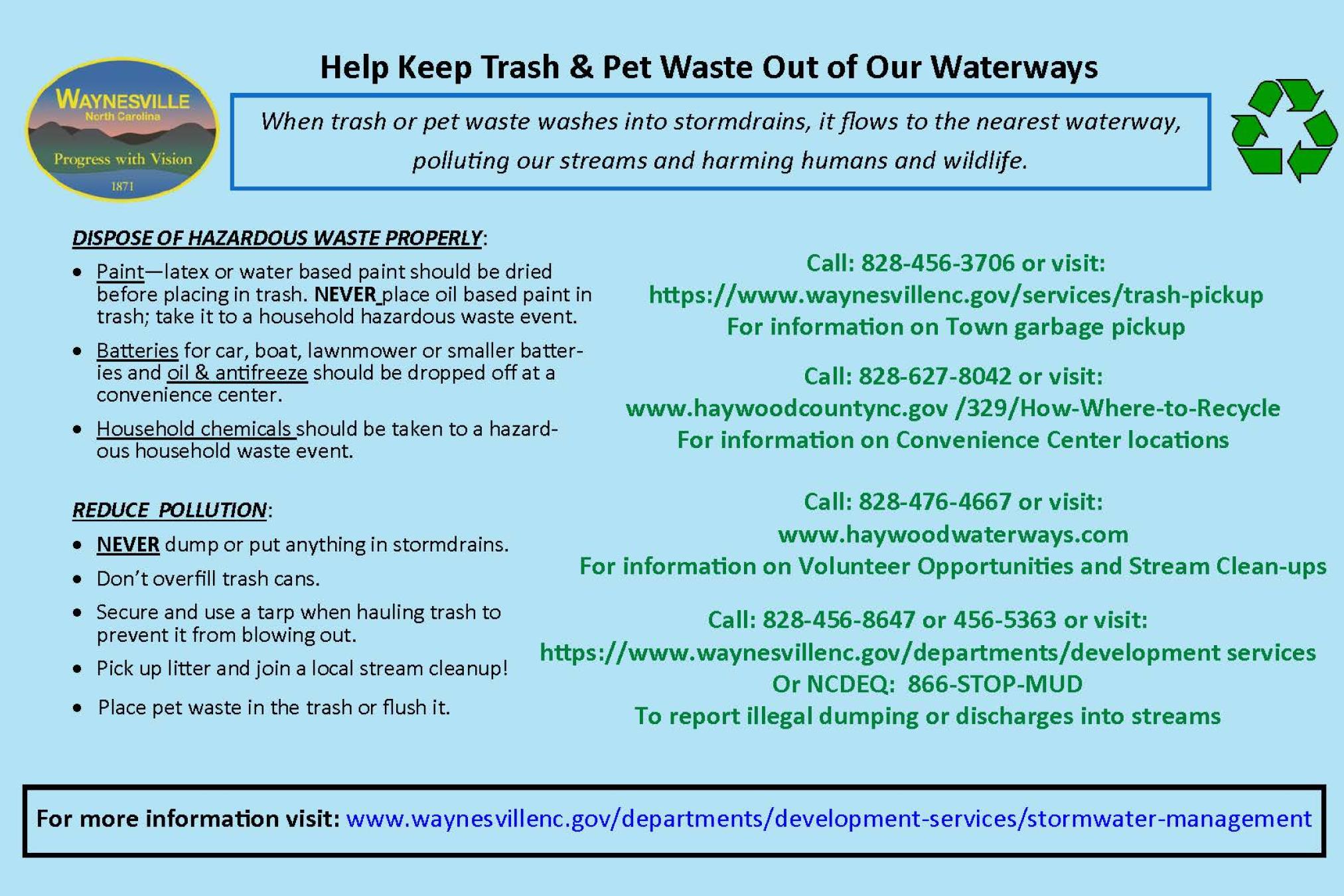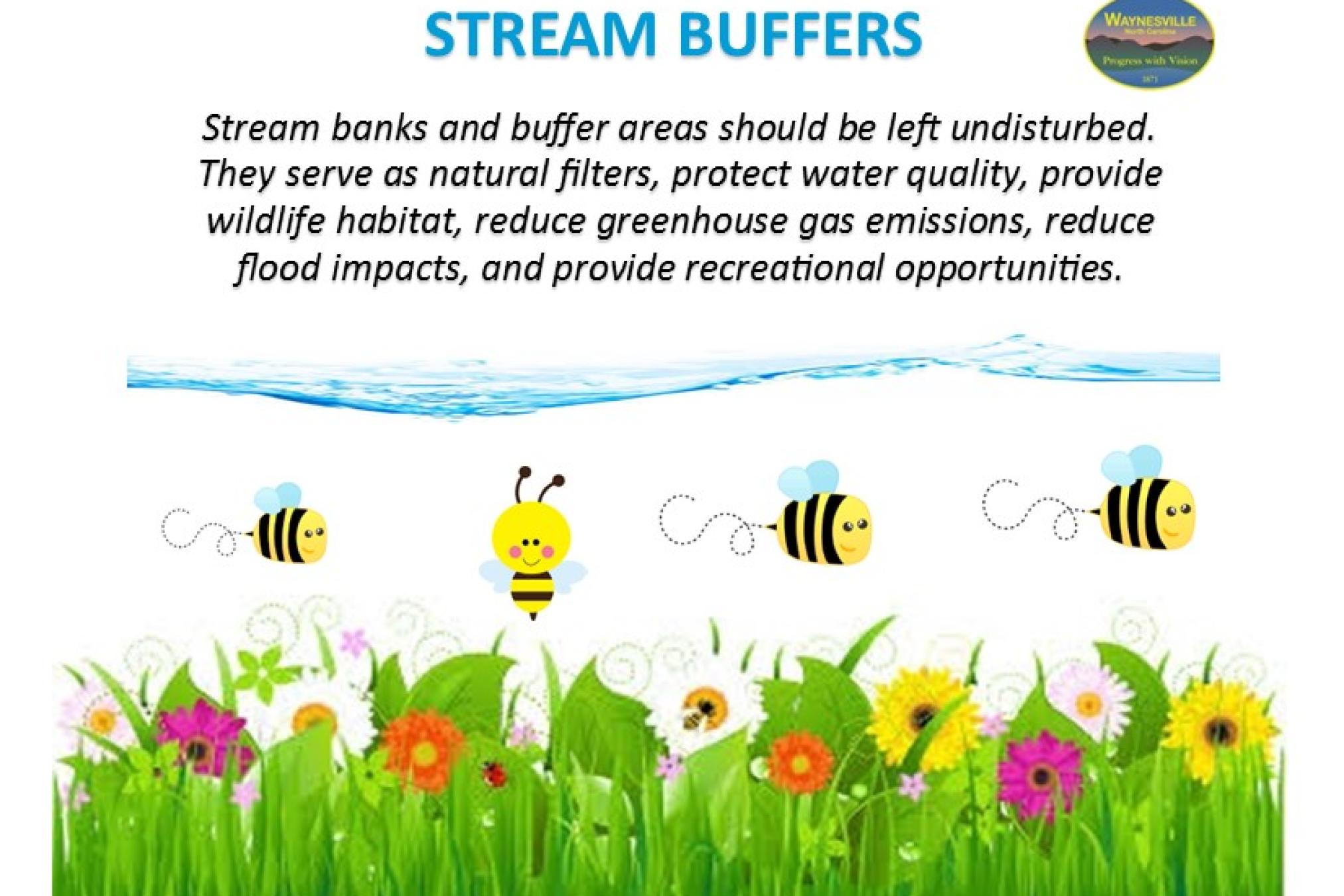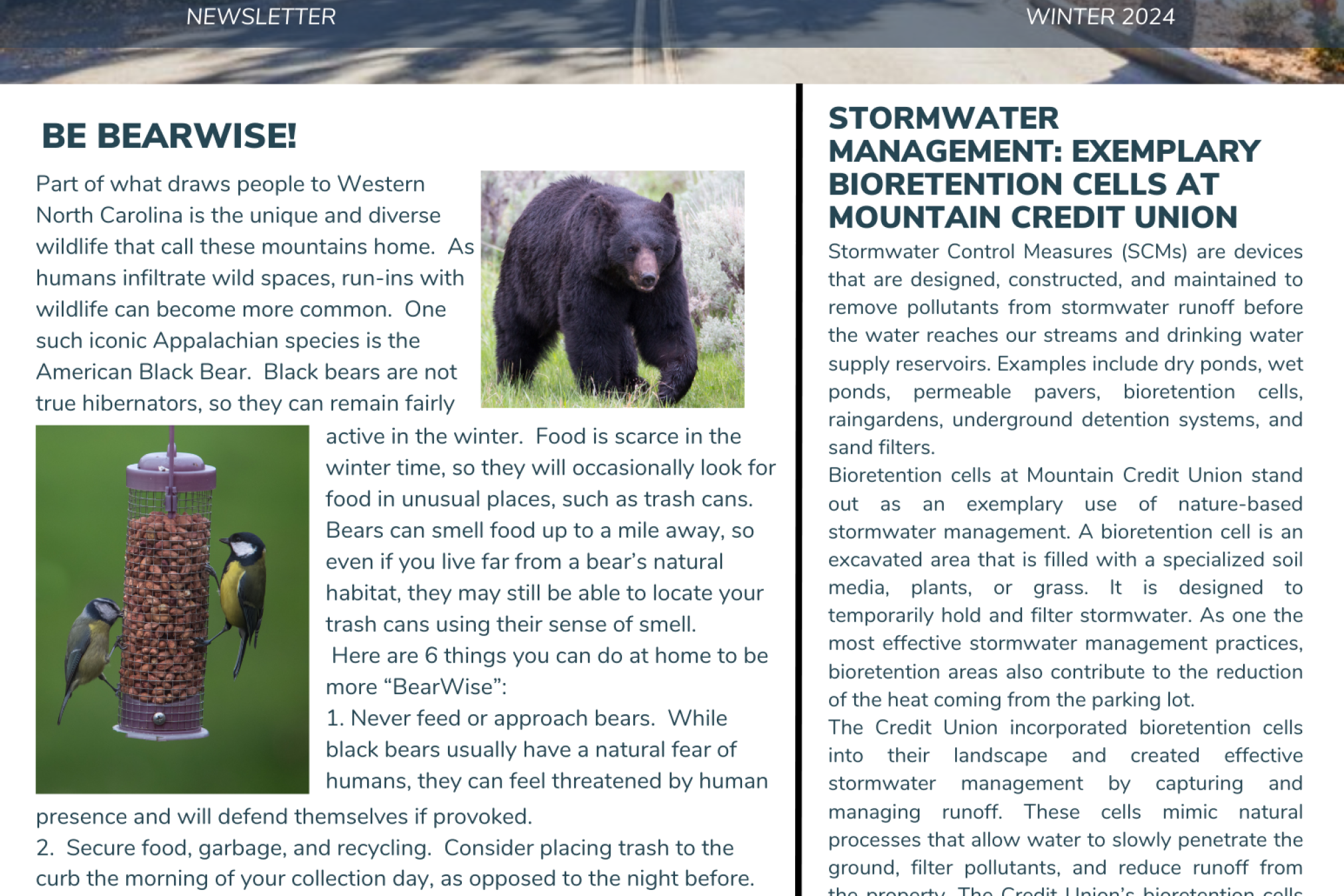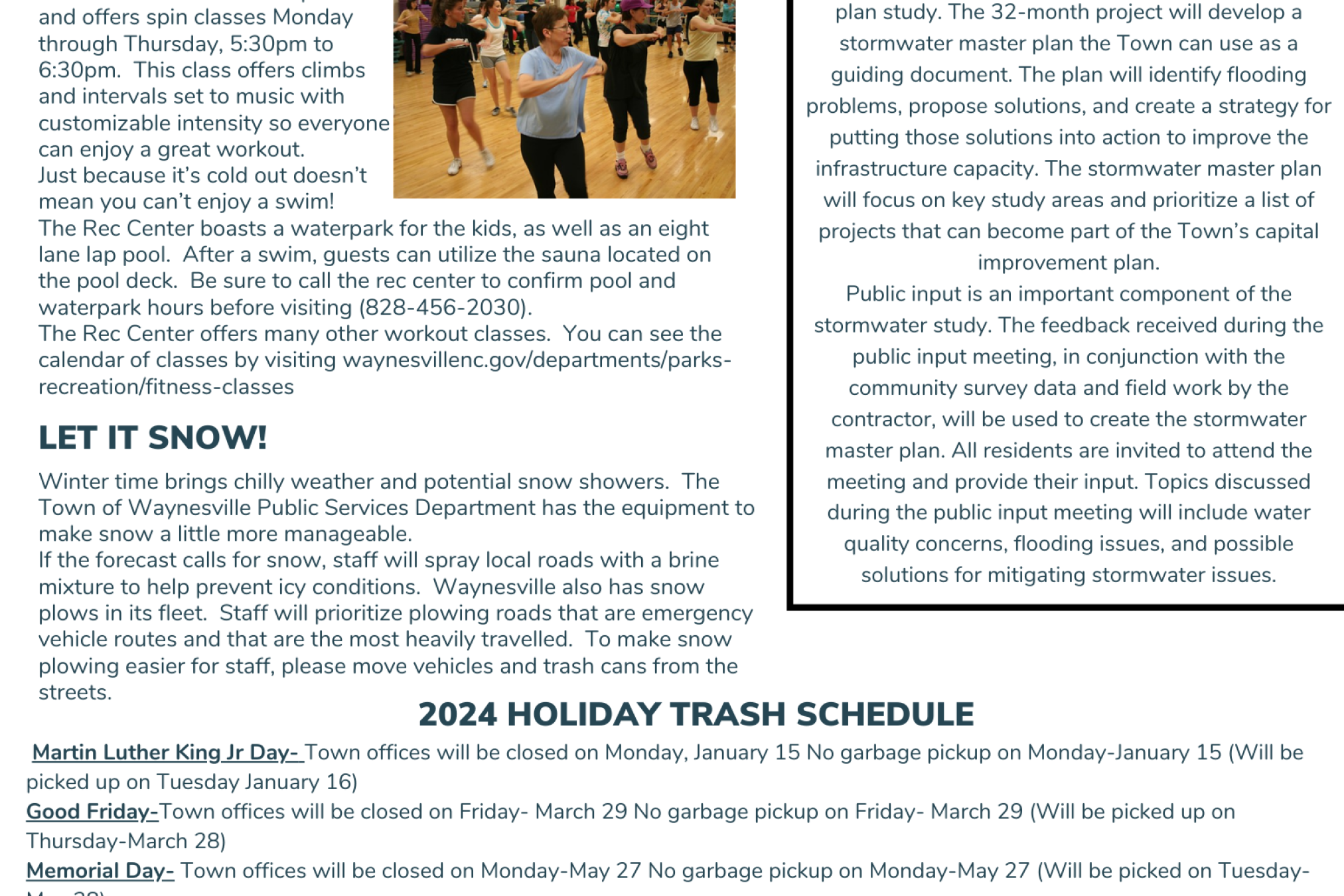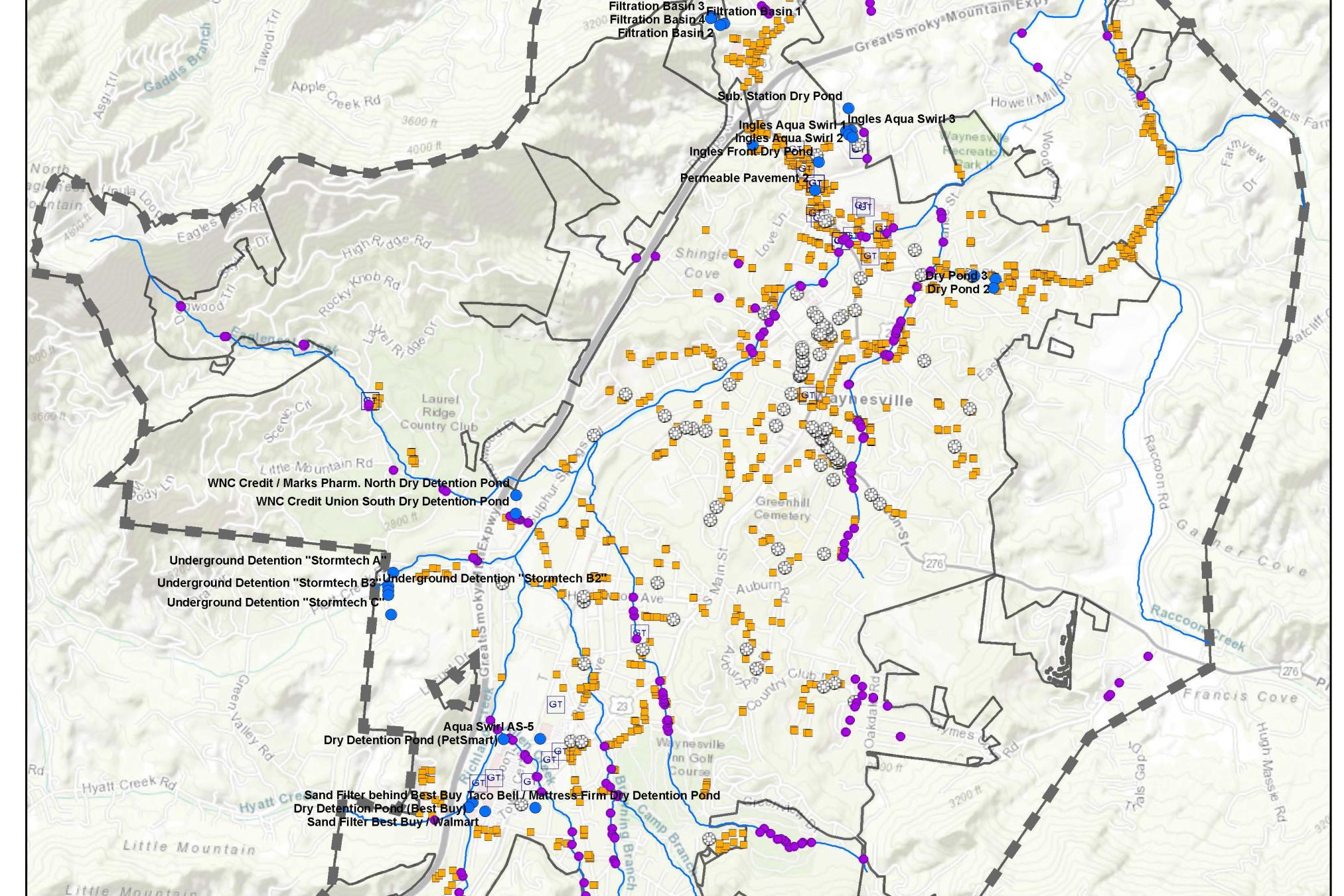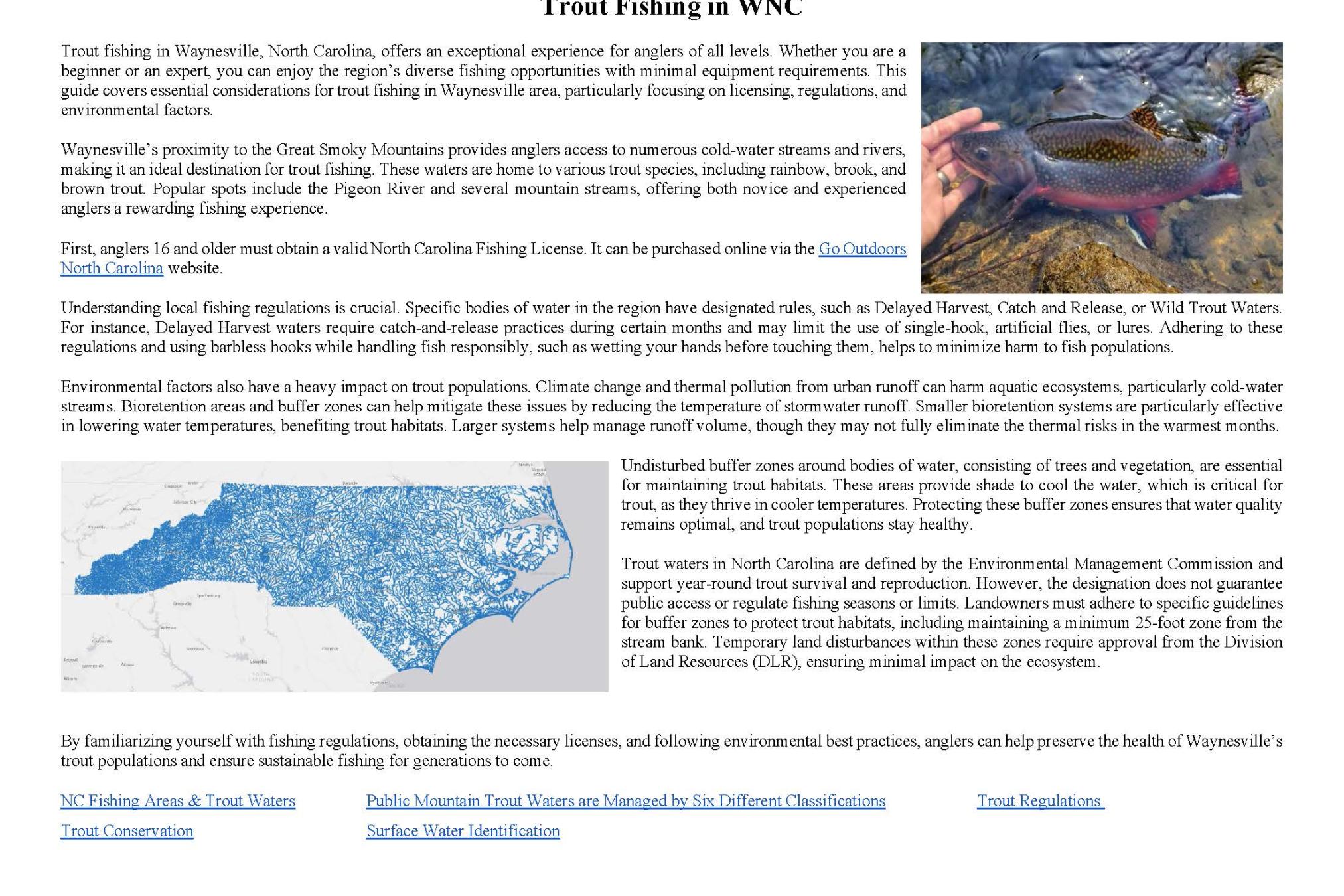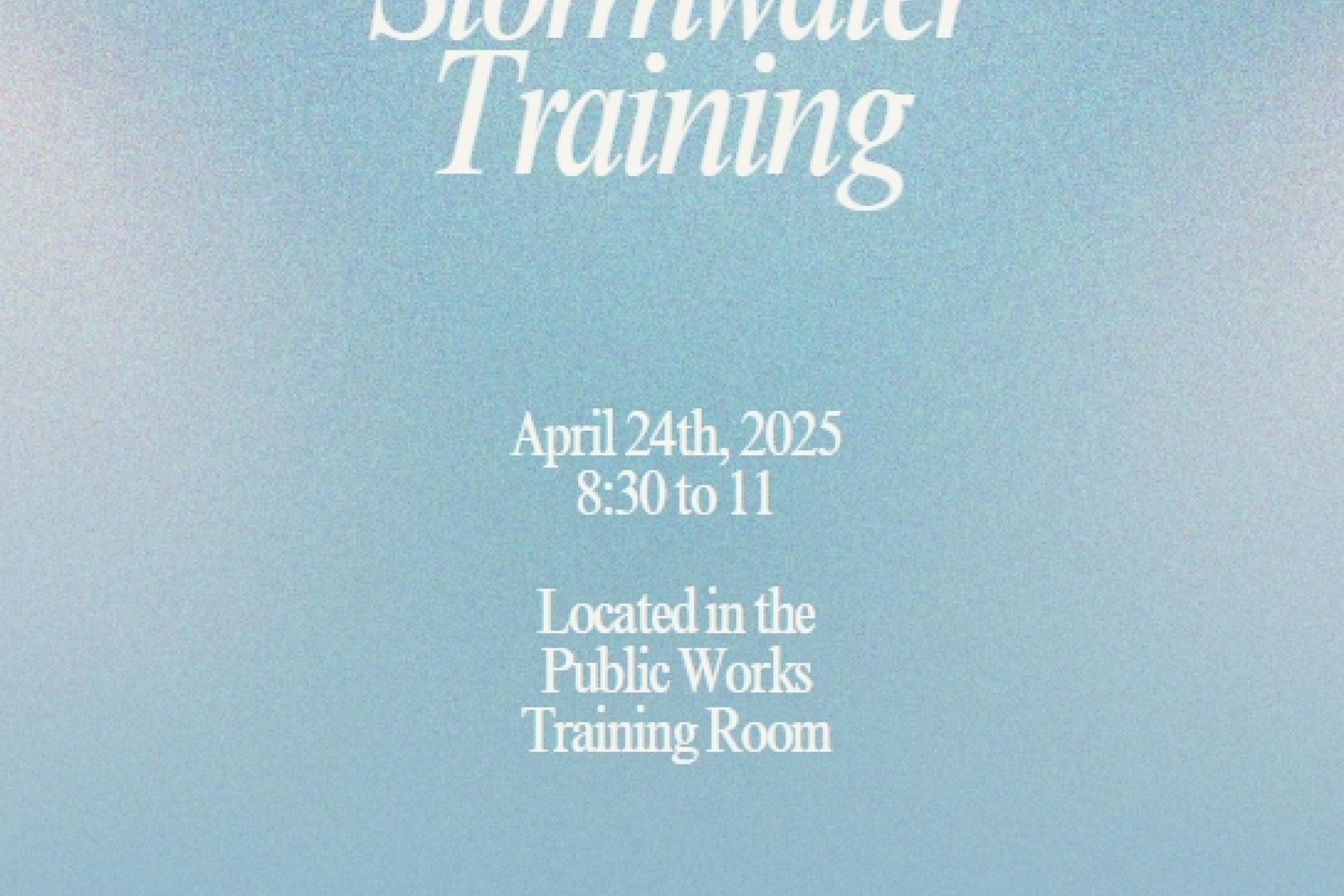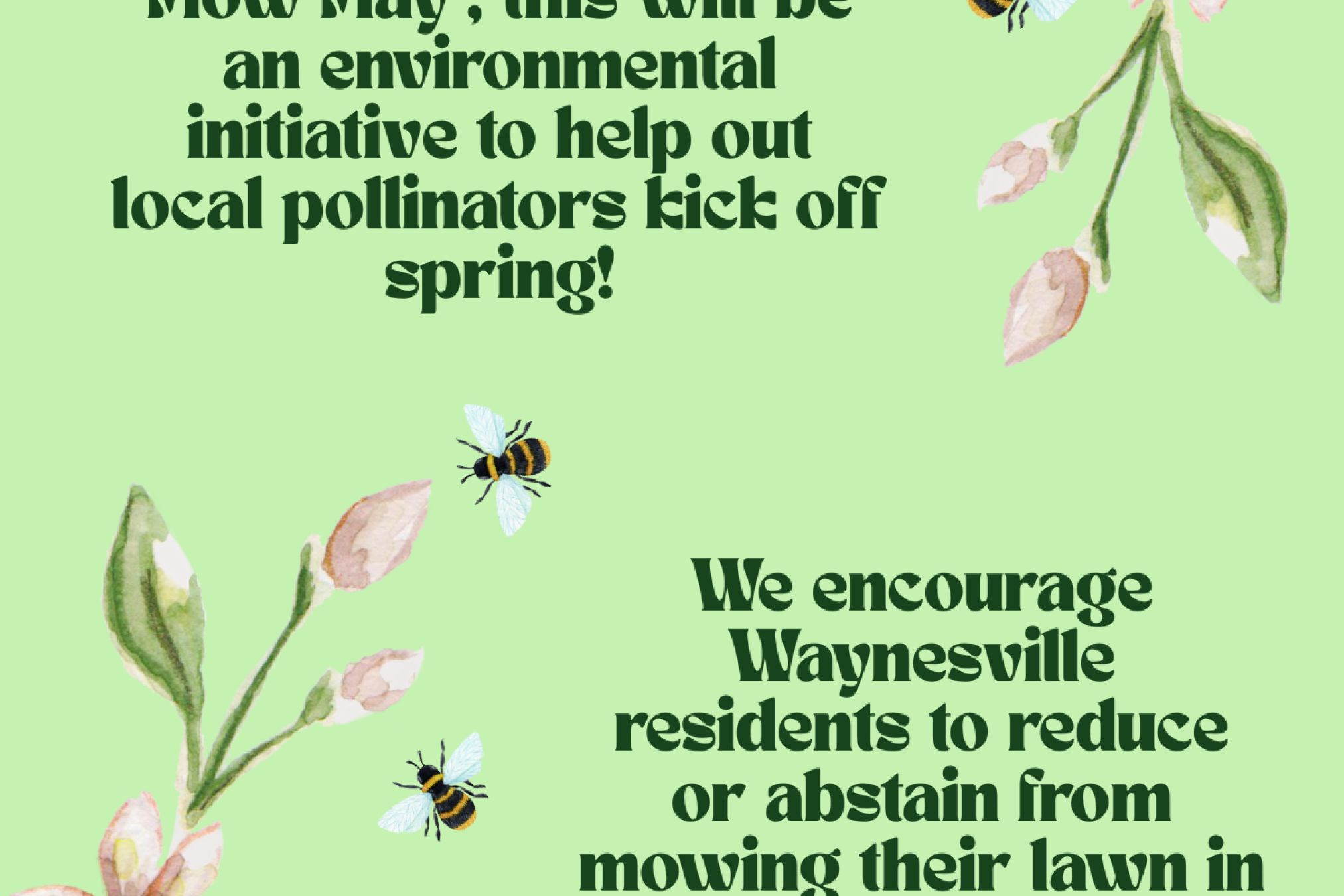- FY 25-26 Full Fee Schedule
- Permits and Application Forms
- Building Inspections
- Code Enforcement
- Land Use (Zoning) Ordinances
- Planning
- Planning Documents & Maps
- Comprehensive Plan Update
- Meeting Schedule & Application Deadlines
- Stormwater Management
- Frequently Asked Questions
- Información en Español/Information in Spanish
- LDS Updates
- Special Projects
- Standard Specifications of the Public Services Department Manual
- Density Work Group 2023-2024
- Landscaping for Projects
The Environmental Protection Agency (EPA) defines stormwater as a rainwater or melted snow that runs off streets, lawns, and other sites. When stormwater is absorbed into soil, it is filtered and ultimately replenishes aquifers or flows into streams and rivers.
The Town of Waynesville utilizes its Stormwater Management Plan to improve local water quality and comply with the National Pollutant Discharge Elimination System Permit (NPDES) and the applicable provisions of the Clean Water Act. The Stormwater Management Plan comprises Public Education and Outreach, Public Participation, Construction Site Runoff Controls, Post-Construction Site Runoff Controls, IDDE (Illicit Discharge, Detention and Elimination), Pollution Prevention and Good Housekeeping, and Annual Self-Assessments. The goal of the stormwater program is to preserve, restore, and protect local waterways as well as address the needs of the local community.
Town of Waynesville MS4 Public Education Poster
The Town of Waynesville Stormwater Map is located on the arcgis.com website. The map is updated periodically. It contains the following layers:
- Municipal and private SCMs within the Town of Waynesville- type, ownership, and date of the last inspection;
- Outfalls and culverts
- Storm drains
- Catch basins
- Waynesville Hydro Clip- major streams;
- Grease traps
- Zoning Districts
- Town of Waynesville boundaries
Click here to access the PDF version of the official Town of Waynesville Stormwater map.
Other stormwater maps:
Outfalls Map (as of August 23, 2024)
Outfalls Map (as of August 4, 2025)
Stormwater questions or to report an illicit discharge:
Monday to Friday, 8 am - 4:30 pm
Development Services: email: ogrooman@waynesvillenc.gov or call: (828) 356-1172
Haywood Waterways: email: info@haywoodwaterways.org or call: (828) 476-4667 EXT 10
Holidays and After Hours
Call: (828) 456-5363
NC Department of Environmental Quality Hotline
Call: 1-866-STOP-MUD
When calling, please be prepared to share the following information: time/date, location, and description of the issue
Please check the sections in the drop-down menu below to learn about our stormwater program.
About the Stormwater Program
NPDES Program
In response to the 1987 amendments to the Clean Water Act, the Environmental Protection Agency (EPA) developed Phase I of the Stormwater Program in 1990. Phase I of the program requires a NPDES permit coverage for medium and large municipal separate storm sewer systems (MS4s) serving populations of 100,000 people or more.
The Stormwater Phase II Final Rule (1999) was the next step taken by the EPA to protect the water resources of the United States from polluted stormwater runoff. Phase II of the NPDES program requires operators of small municipal separate storm sewer systems (MS4s) with population less than 100,000 to obtain a NPDES permit and develop a stormwater management program. The goals of the NPDES Phase II program are to reduce the discharge of pollutants, to protect water quality, and to satisfy the appropriate water quality requirements of the Clean Water Act. Learn more about the NPDES Phase I and Phase II stormwater guidance on the NC Department of the Environmental Quality website.
In North Carolina, it is required that a Phase II municipality develops, implements, and enforces the following "Six (6) Minimum Measures" to stay in compliance:
1. Public education and outreach
2. Public participation/involvement
3. Illicit discharge detection and elimination
4. Construction site stormwater runoff control
5. Post-construction runoff control
6. Pollution prevention/good housekeeping
What is an NPDES permit?
The Clean Water Act prohibits anybody from discharging "pollutants" through a "point source" into a "water of the United States" unless they have an NPDES permit. The permit will contain limits on what you can discharge, monitoring and reporting requirements, and other provisions to ensure that the discharge does not hurt water quality or people's health. Click here to learn more about the NPDES Permit.
Annual Self-Assessment
The NCDEQ requires all MS4s to submit annual self-assessment reports that evaluate the implementation of the stormwater program. What is an MS4?
Copies of the submitted self-assessment reports for the Town of Waynesville can be found below:
Self-Assessment FY 21-22 (will need to zoom in)
Illicit Discharge Detection and Elimination Program (IDDE)
The Town of Waynesville Stormwater Management Plan identifies specific elements of implementation and enforcement of the IDDE Program by the Town in accordance with the 40 CFR §122.34(b)(3). The purpose of the Town's IDDE Program is to prohibit, detect, and eliminate illicit connections, discharging, illegal dumping, and spills into the MS4. The program also focuses on staff training and public awareness of illicit discharges, improper disposal of waste, and reporting procedures.
Waynesville has developed the IDDE Plan that includes standard operating procedures and documentation for investigation of potential illicit discharges, illicit connections, and illegal dumping. The NC DEQ officially approved the Town's Plan on June 17, 2022. Waynesville Development Services Department staff review this plan annually for potential updates. Click here to access the PDF version of the Waynesville IDDE Plan.
As a part of the program, the Town conducts regular dry weather (no rain in previous 72 hours) inspections of the storm drain system outfalls. The goal of these inspections is to prevent potential illicit discharges, identify non-storm water flows and sources of pollution.
Map of Inspected Outfalls 2022-2025
Town of Waynesville Outfall Map (previous version)
Waynesville Outfall Inspection Form
What is the Difference between Stormwater Systems and Sanitary Sewer Systems?
- Water that flows to the stormwater system through curb inlets on the streets (or other structures) usually goes directly into the creek, stream, or river. This water does not get treated at the plant. Stormwater systems are also called storm sewer systems.
- Water that goes to the sanitary sewer system through toilet flushing, shower drains, etc., is treated at the wastewater treatment plant to achieve certain quality before it gets discharged into a creek or stream.
What is an Illicit Discharge?
The EPA defines an illicit discharge as “...any discharge to an MS4 that is not composed entirely of stormwater...” with some exceptions, such as discharges from NPDES-permitted industrial sources and discharges from fire-fighting activities.
Illicit discharges are considered “illicit” because MS4s are not designed to accept, process, or discharge these non-stormwater wastes. They result in untreated flows to the stormwater system and significantly degrade water quality, disrupt aquatic habitats, and pose serious risks to human health and wildlife. Pollutants commonly found in illicit discharges include:
- Heavy metals
- Toxins
- Grease and oil
- Paint
- Solvents
- Nutrients
- Raw sewage (viruses and bacteria).
Follow this link to the EPA resource to learn more about illicit discharge detection and elimination measures.
The Town of Waynesville Illicit Discharge Ordinance specifically prohibits illicit discharges to the storm sewer system. However, some non-stormwater discharges are allowed if they do not significantly impact water quality. These discharges include:
- Residential vehicle washing
- Filter backwash and draining associated with swimming pools
- Discharges from fire-fighting activities
- Uncontaminated ground water
- Irrigation water
- Street wash water
- Condensate from residential or commercial air conditioning
- Collected stormwater from foundation or footing drains
- Discharges from pumping or draining of natural watercourses
Report an Illicit Discharge
Only rain goes into a storm drain! Call (828) 456-8647 (Development Services Department) or email: ogrooman@waynesvillenc.gov to report illegal dumping into streams or storm drains.
Additional Resources
Illicit Discharge Detection and Elimination Guidance Manual by the Center for Watershed Protection
Post-Construction Stormwater Management
The Town of Waynesville Stormwater Ordinance requires that Stormwater Control Measures (SCMs) be inspected annually to continue their function in controlling stormwater runoffs to the extent they were originally designed. An inspection can be performed by a qualified service provider, such as a North Carolina professional engineer, landscape architect, or a person certified by the North Carolina Cooperative Extension Service for stormwater inspection and maintenance.
For questions about the post-construction stormwater requirements, contact Olga Grooman: call 828-356-1172 or email ogrooman@waynesvillenc.gov
Relevant Forms and Documents:
NC DEQ Stormwater Design Manual
SCM Operations and Maintenance Agreements
Most Common Stormwater Control Measures
The Cover Sheet below needs to be submitted along with one inspection form for each SCM on the site:
Post-Construction Inspection Cover Sheet
Pollution Prevention and Good Housekeeping Program
The Town of Waynesville Stormwater Management Plan provides a comprehensive pollution prevention and good housekeeping strategy for the Town's municipal facilities and operations. Pollution prevention and good housekeeping is accomplished through the implementation of programs that collectively address the ultimate goal of preventing or reducing pollutant runoff from municipal operations, such as parks and open space maintenance, fleet and building maintenance, new construction and land disturbances, and municipal storm sewer system maintenance.
Municipal SCM Operations and Maintenance Program manages municipally-owned, operated, and/or maintained stormwater control measures (SCMs). The Town maintains a current inventory of its SCMs, performs SCMs inspections and maintenance, and documents the records.
Public Hearings and Presentations
2025
-
The Development Services Department and Haywood Waterways will give a public presentation to the Waynesville Town Council about the stormwater program and stormwater-related issues on October 14, 2025, beginning at 6:00 p.m. or as closely thereafter as possible in the Town Hall Board Room located at 9 South Main Street, Waynesville. The topics will include general stormwater issues, such as household runoff, sediment and erosion, and an overview of the NPDES audit.
Please click here to access the presentation.
-
Waynesville Town Council will hold a public hearing on Tuesday, August 26, 2025, at 6:00 pm in the Town Hall Board Room, located at 9 South Main Street, Waynesville, NC 28786, to consider text amendments to Land Development Standards Section 12.5 related to applicability and exemptions in the stormwater ordinance.
Please click here to access the proposed text amendment.
-
The Town of Waynesville Planning Board will hold a public hearing on Monday, June 16, 2025, at 5:30 pm in the Town Hall Board Room, located at 9 South Main Street, Waynesville, NC 28786, to consider text amendments to Land Development Standards Section 12.5 related to applicability and exemptions in the stormwater ordinance.
Please click here to access the Planning Board agenda.
- Development Services Department will give a public presentation to the Waynesville Town Council about the educational Stormwater Banner project designed by our local elementary schools and our environmental initiative "No Mow May". This will take place on April 22, 2025, beginning at 6:00 p.m. or as closely thereafter as possible in the Town Hall Board Room located at 9 South Main Street, Waynesville. For more information, contact the Development Services Department at: (828) 356-1172, email: tanderson@waynesvillenc.gov, mail: 9 South Main Street, Suite 110, Waynesville, NC 28786.
Please click here to access a copy of the presentation about Stormwater Banners.
Please click here to access a copy of the presentation about "No Mow May."
2024
- Haywood Waterways and Development Services Department will give a public presentation to the Waynesville Town Council about the stormwater program and stormwater-related issues on November 12, 2024, beginning at 6:00 p.m. or as closely thereafter as possible in the Town Hall Board Room located at 9 South Main Street, Waynesville. The topics will include: thermal stress, household runoff, and overview of the NPDES Permit. For more information, contact the Development Services Department at: (828) 356-1172, email: ogrooman@waynesvillenc.gov , mail: 9 South Main Street, Suite 110, Waynesville, NC 28786.
Please click here to access a copy of the presentation.
-
Waynesville to Hold Public Input Meeting for Stormwater Master Plan
The Town of Waynesville is hosting a public input meeting as part of the stormwater master plan study on Thursday, February 22, 2024, from 5-7 p.m. at the Waynesville Recreation Center (550 Vance Street). For more information, contact Development Services, T: (828) 456-8647.
In October, the Town contracted with WithersRavenel, Inc. to launch a stormwater master plan study. The 32-month project will develop a stormwater master plan the Town can use as a guiding document. The plan will identify flooding problems, propose solutions, and create a strategy for putting those solutions into action to improve the infrastructure capacity. The stormwater master plan will focus on key study areas and prioritize a list of projects that can become part of the Town’s capital improvement plan.
Public input is an important component of the stormwater study. The feedback received during the public input meeting, in conjunction with the community survey data and field work by the contractor, will be used to create the stormwater master plan. All residents are invited to attend the meeting and provide their input. Topics discussed during the public input meeting will include water quality concerns, flooding issues, and possible solutions for mitigating stormwater issues.
2023
- Haywood Waterways and Development Services Department will give a public presentation to the Waynesville Town Council about the stormwater program and stormwater-related issues on October 10, 2023, beginning at 6:00 p.m. or as closely thereafter as possible in the Town Hall Board Room located at 9 South Main Street, Waynesville. The topics will include: overview of the Town’s NPDES Permit, erosion and sedimentation. For more information contact the Development Services Department at: (828) 356-1172, email: ogrooman@waynesvillenc.gov , mail: 9 South Main Street, Suite 110, Waynesville, NC 28786.
Please click here to access a copy of the presentation.
- Waynesville Town Council will hold a public hearing on May 23, 2023, at 6:00 p.m. or as closely thereafter as possible in the Town Hall Board Room, located at 9 South Main Street, Waynesville, NC, to consider the Stormwater Ordinance text amendment related to the design of the stormwater structures, Section 12.5 of the Land Development Standards (LDS). For more information contact the Development Services Department at: (828) 356-1172, email: ogrooman@waynesvillenc.gov , mail: 9 South Main Street, Suite 110, Waynesville, NC 28786
Please click here to access the proposed text amendment.
- Waynesville Town Council will hold a public hearing on May 23, 2023, at 6:00 p.m. or as closely thereafter as possible, in the Town Hall Board Room, located at 9 South Main Street, Waynesville, NC, to consider text amendment to Section 44-2 of the Municipal Code related to disposal and containment of construction and demolition material.
Please click here to access the proposed text amendment.
- The Town of Waynesville Planning Board will hold a public hearing on April 26, 2023, at 5:30 pm, in the Town Hall Board Room, located at 9 South Main Street, Waynesville, NC, to consider the Stormwater Ordinance text amendment related to the design of the stormwater structures, Section 12.5 of the Land Development Standards (LDS). For more information contact the Development Services Department at: (828) 356-1172, email: ogrooman@waynesvillenc.gov , mail: 9 South Main Street, Suite 110, Waynesville, NC 28786.
Please click here to access the proposed text amendment.
- The Development Services Department introduced the "Pause for Pollinators / No-Mow May" initiative to the Board of Aldermen on April 11, 2023. With the full support of the Board, some areas of the Town will be left undisturbed in late April-May, and the residents will get educational postcards via mail.
Please click here to access a copy of the presentation.
A copy of the postcard can be accessed here.
2022
- The Town of Waynesville Board of Aldermen will hold a Public Hearing on December 13, 2022, at 6:00 pm, in the Town Hall Board Room located at 9 South Main Street, Waynesville, NC, to consider the general revisions to the Land Development Standards (LDS). One of the additions is to include hydroplaning protections in the LDS to ensure public safety for the projects that fall under the stormwater ordinance. This will include major site plans and large subdivisions. Please contact Development Services at 828-456-8647 with questions.
Please click here to access the proposed text amendment.
- Haywood Waterways and Development Services Department will give a public presentation about the stormwater program and stormwater-related issues at the Board of Aldermen meeting on November 22, 2022, at 6 pm, in the Town Hall Board Room located at 9 South Main Street, Waynesville, NC. The topics will include: overview of the Town’s NPDES Permit, proper waste disposal, and pet waste. Please contact Development Services at 828-456-8647 with questions.
Please click here to access a copy of the presentation from November 22, 2022.
- The Town of Waynesville Planning Board will hold a Public Hearing on October 17, 2022, at 5:30 pm, in the Town Hall Board Room located at 9 South Main Street, Waynesville, NC, to consider the general revisions to the Land Development Standards (LDS). One of the additions is to include hydroplaning protections in the LDS to ensure public safety for the projects that fall under the stormwater ordinance. This will include major site plans and large subdivisions. Please contact Development Services at 828-456-8647 with questions.
Please click here to access the proposed text amendment.
- The Town of Waynesville Board of Aldermen will hold a Public Hearing on Tuesday, March 22, 2022, at 6:00 pm, in the Town Hall Board Room located at 9 South Main Street, Waynesville, NC, to consider the text amendment to the Stormwater Ordinance, Land Development Standards (LDS) Sections 12.5 and 15.4.1. Please contact Development Services at 828-456-8647 with questions.
Please click here to access a copy of the proposed text amendment.
- The Town of Waynesville Planning Board will hold a Public Hearing on February 21, 2022 at 5:30 pm, in the Town Hall Board Room, located at 9 South Main Street, Waynesville, NC, to consider the text amendment to the Stormwater Ordinance, Land Development Standards (LDS) Sections 12.5 and 15.4.1. Please contact Development Services at 828-456-8647 with questions.
Please click here to access a copy of the proposed text amendment.
2021
The Town of Waynesville Board of Aldermen held a Public Hearing on Tuesday, December 14, 2021, at 6:00 p.m. in the Town Hall Board Room located at 9 South Main Street, Waynesville. The purpose of this Public Hearing was to allow the presentation of the Town of Waynesville Stormwater Program, stormwater issues, and provide a platform for public input. Please contact Development Services at 828-456-8647 with questions.
Please click here to access a copy of the public presentation from 12/14/2021.
Please click here to access the Mountaineer article about this Public Hearing.
Please click here to access the Minutes from the presentation on 12/14/2021.
Community Projects
Rain Garden at Waynesville Greenway (2021)
Development Services, Waynesville Public Works Department, Haywood Waterways, and students from Western Carolina University have finished the restoration of the Rain Garden at the Waynesville Greenway. It is not just a garden. It is a stormwater control measure constructed in several layers: 12 inches of wash stone on the bottom, filter fabric tightly covering the wash stone, soil with plants, and mulch. Filter fabric separates the wash stone and soil and prevents the loss of the soil. The wash stone will hold rain water and slowly infiltrate in into the ground, reducing the amount of pollutants and runoff. We planted our garden with Ginger Wine, American Witch-Hazel, Elderberry, Carolina Allspice, and American Beautyberry plants.
Click here to read the Mountaineer article about this community project.
A rain garden is a shallow area in the landscape with water-tolerant, native plants and well-drained soils. Rain gardens collect rainwater from the streets or roofs and infiltrate it into the soil. They are effective in removing pollutants from stormwater runoff through absorption, infiltration, evapotranspiration, and microbial action. They also reduce the amount of stormwater runoff that goes into the receiving waters.
Rain gardens are great for small areas, such as backyards, parking lots, and sidewalks. Advanced rain gardens have drainage systems and altered soils. They are called bioretention cells. Click here to learn more about rain gardens and how to build and maintain them.
Pictures of the Waynesville Rain Garden Project
Before:
In the Works:

 We are excited to see our Rain Garden in full bloom this Spring!
We are excited to see our Rain Garden in full bloom this Spring!
* * * * * * * * * * * * * * * * * * *
French Drain at Waynesville Recreation Center (2022)
Development Services Department coordinated with the Public Works to extend the French drain in a disc golf area that seems to stay wet for a long time after rain. How does a French drain work? It provides a subsurface channel for rainwater to run through. It is a type of infiltration trench with piping. Water runs underground into a perforated pipe that is usually wrapped in a filter fabric and surrounded by a wash stone. Filter fabric and wash stone serve as a barrier and prevent the soil from clogging up the perforated pipe. Rainwater penetrates the soil and travels through the pipe away from the surface. Our French drain diverts excess rainwater into a nearby storm drain.
French drains are very effective because they collect water along the entire surface of the drain!
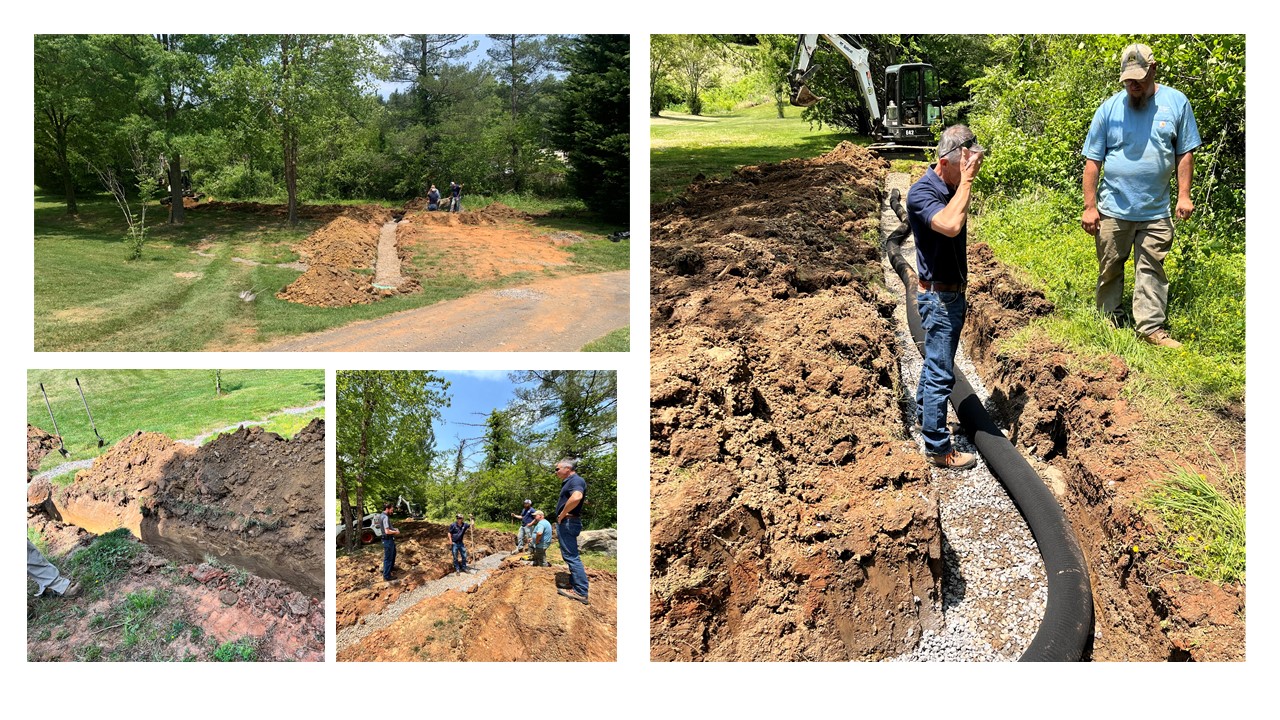
Click the links below to learn more about French drains and how to install one yourself:
Educational Resources
The Environmental Protection Agency (EPA) defines stormwater as a rainwater or melted snow that runs off streets, lawns, and other sites. When stormwater is absorbed into soil, it is filtered and ultimately replenishes aquifers or flows into streams and rivers.
Landscaping Practices for Developers and Homeowners
Trout Fishing in WNC (January 27, 2025)
Utilizing Rainwater and Gravity: A Guide to Rain Gardens Special thanks to Amelia for finding this useful article! (posted on February 23, 2024)
Exemplary Bioretention Cells at Mountain Credit Union (winter 2024)
Be Smart When Applying Fertilizer to Your Lawn (August 2023)
Lawn Fertilizers by Haywood Waterways (October 2022)
Pet Waste Article by Haywood Waterways
Yard Waste Article by Haywood Waterways
Trash Article by Haywood Waterways
Why is stormwater run-off an issue?
Best Management Practices (BMP's)
Waynesville Stormwater Ordinances (Appendix A, Chapter 12, Section 12.5 of the Code of Ordinances)
Free NCDEQ Stormwater Webinars- great educational resource for general public, developers, property owners, municipal staff, and educators.
Leaking Automobile Fluids Pollute Waterways (article in the Mountaineer on April 15, 2023)
Scroll down to our Educational Gallery section to access educational posters and postcards.

